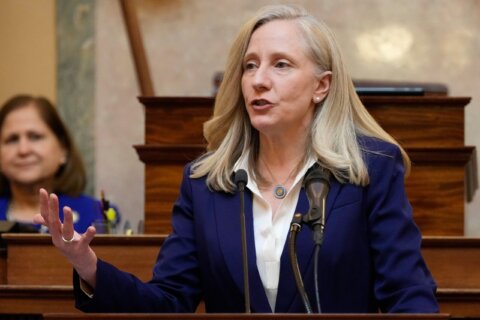Some military families in Virginia have a feeling of “betrayal” after the state Senate reconvened Monday but left for the day without voting to lift new restrictions on a program that provides educational benefits to families of veterans.
The Senate’s inaction came after Virginia’s House of Delegates voted unanimously Friday to remove those restrictions on the Virginia Military Survivors and Dependents Education Program, which provides free college tuition at state schools for families of veterans who were killed or seriously disabled while on active duty.
The Senate considered doing the same, but Republican and Democratic leaders disagreed on how to move forward.
Senate Majority Leader Scott Surovell said he and Senate Finance Committee Chairwoman L. Louise Lucas met privately for hours with Republican Gov. Glenn Youngkin earlier Monday but could not reach an agreement on any of their proposals.
“He wanted full repeal and taxpayers cover the cost and we’ll talk about it in January. … He just basically said, ‘Trust me,’” Surovell said. “There’s not a whole lot of trust there right now.”
It is not clear when the Senate might try again.
“I think betrayal is a very accurate word to describe how a lot of folks feel,” said Heath Dunbar, a disabled Army veteran who lives in Chesapeake, Virginia. “They’re exhausted, and they are frustrated.”
Dunbar’s son is in college, and he benefits from the program.
“What the program has allowed us to do is to set the costs for tuition and fees to the side and use the savings and income that we have to fund his room and board and other expenses that are associated with college,” Dunbar said. “It has greatly helped us.”
Now, there is a lot of uncertainty.
“There are families who are not able to send their kids to college right now or to make any further plans because they just don’t know what’s going to happen,” Dunbar said. “The rug has been yanked out from under them.”
To rein in costs, the recently passed state budget restricted program eligibility to associate and undergraduate degrees, required participants to apply for other forms of financial aid and tightened residency requirements.
Friday’s bill that passed in the House would eliminate those restrictions. Meanwhile, a task force created by Youngkin is studying the issue and is expected to recommend permanent changes to be taken up in next year’s legislative session to make the program financially viable.
“Some families have planned their lives around this benefit,” Dunbar said. “They have made plans and serious financial decisions based on the availability of this program.”
The program’s popularity has exploded and become increasingly costly for Virginia’s state colleges. Over the past five years, enrollment in the program increased from 1,385 students to 6,107.
The cost increased from $12 million to $65 million.
Youngkin said he would order the House and Senate to come back to Richmond if they do not come up with a fix.
“Senate Democrat leadership is hurting our military heroes, first responders and their families every time they show up and do nothing, as well as wasting time and taxpayer money,” he said in a statement.
The Associated Press contributed to this report.
Get breaking news and daily headlines delivered to your email inbox by signing up here.
© 2024 WTOP. All Rights Reserved. This website is not intended for users located within the European Economic Area.








